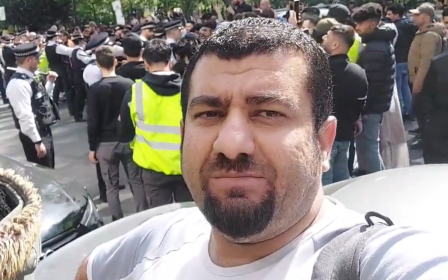Iraqi government announces investigation into kidnapped Israeli researcher

The Iraqi government has announced it is conducting a formal investigation into the apparent kidnapping of Israeli researcher Elizabeth Tsurkov, as the armed group that was previously believed to be responsible indicated it did not have her.
Tsurkov, a fellow at New Lines Institute and a doctoral student at Princeton University's Department of Politics, disappeared in March after last being seen in the Karrada region of Baghdad.
Tsurkov frequently made contact with local Arab sources, journalists and researchers across Iraq and Syria and was part of a group promoting female journalists and analysts and their work in the region.
Government spokesman Bassem al-Awadi said on Thursday that "the Iraqi government is indeed conducting an official investigation" into her disappearance.
There are no diplomatic relations between Israel and Iraq, whose government is close to Israel's arch-rival Iran, and Israelis are not allowed to visit the country.
A law passed last year stepped up the penalties for Iraqis making contact with Israelis, with punishment potentially amounting to life imprisonment or the death penalty.
CCTV footage released by Iraqi TV channel Al-Rabiaa appeared to show Tsurkov - who came to Iraq on her Russian passport - entering a cafe in the Karrada region, apparently the popular Ridha Alwan coffee shop from where she was abducted by Kataeb Hezbollah, according to the New York Times.
However, a spokesperson for Kataeb Hezbollah on Thursday appeared to imply that they were not responsible for her kidnapping.
In a statement, Abu Ali al-Askari said his organisation was working to uncover the whereabouts of a "Zionist hostage or hostages" in the country, following comments by Israeli Prime Minister Benjamin Netanyahu.
"The admission by the prime minister of the Zionist entity concerning the presence of an Israeli security agent hostage in Iraq is a very dangerous indicator," it said, using a commonly used term for Israel.
"The security organisations concerned should expose networks linked to this entity and bring them to justice."
Middle East Eye propose une couverture et une analyse indépendantes et incomparables du Moyen-Orient, de l’Afrique du Nord et d’autres régions du monde. Pour en savoir plus sur la reprise de ce contenu et les frais qui s’appliquent, veuillez remplir ce formulaire [en anglais]. Pour en savoir plus sur MEE, cliquez ici [en anglais].





